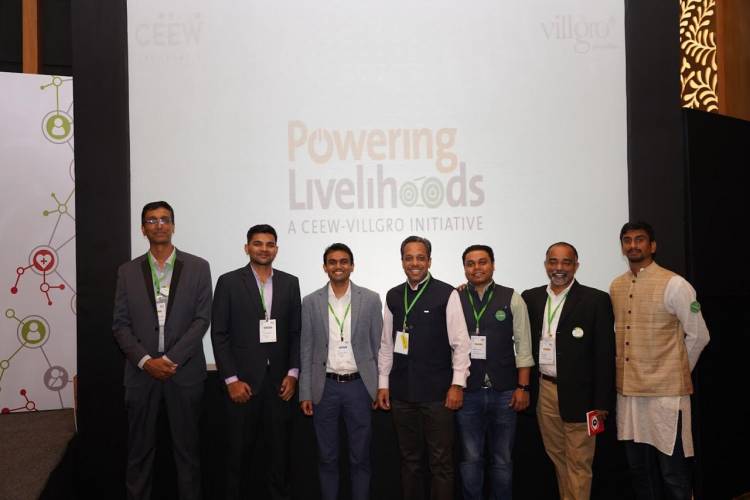CEEW & Villgro launch “Powering Livelihoods”: a $2.5 million initiative to support clean energy-based livelihood solutions to uplift rural economy

Bengaluru, the informal “IT & Tech Capital” of India, has in the last decade received increased national and global recognition as a booming hub for innovative start-ups and social enterprises. A recent NASSCOM report demonstrated that this city is home to more than 1/4th of the existing start-ups in India.
With the constantly growing reputation of Bengaluru as the epicenter of the entrepreneurial ecosystem, , many start-ups in the city are now coming up with disruptive solutions to mitigate climate change and other environmental concerns, mostly by harnessing the power of “clean-tech” and/or renewable energy sources like solar, wind power, biofuels, etc. As a matter of fact, the recent repositioning of Bengaluru and its neighbouring areas as the pioneer in terms of encouraging initiatives relating to clean energy, rooftop solar installation, clean transportation, electric mobility, etc. has not only benefited the city, but further helped Karnataka project itself as the highest renewable energy producer amongst all the states in our country (as revealed through a 2018 report by the Institute for Energy Economics and Financial Analysis).
In order to support innovators who are creating solutions around renewable energy and sustainability, Council on Energy, Environment and Water or CEEW—a leading, independent policy research institution, and Villgro Innovation Foundation—one of India’s oldest and most renowned social enterprise incubators, have jointly rolled on a novel initiative “Powering Livelihoods”, with a vision to bolster India’s rural economy through the scaling up of clean energy solutions. The initiative aims to provide dedicated capital, technical and sectoral growth support to at least five enterprises which are deploying innovative, clean energy-powered livelihood appliances, and shall enable them to undertake large-scale commercial deployments over a period of next three years. The initiative boasts of having under its aegis investment partners like Caspian Debt, Upaya Social Ventures, among others.
In the recent past, more than four million micro enterprises in India have cited lack of reliable electricity as the top bottleneck for their businesses. Providing reliable energy access not only creates new livelihood opportunities but also improves productivity, product value, and incomes. At this point in time, a push on reliable power extension to households needs to be complemented with energy-efficient appliances for livelihoods and industries as well as decentralized renewable energy-based products and encouraging their applications in everyday life and industrial activities.
Speaking on the initiative, Arunabha Ghosh, CEO, Council on Energy, Environment and Water (CEEW) said, “India alone has more than USD 50bn worth of market for clean energy solutions for rural livelihoods; ‘Powering Livelihoods’ aims to catalyze the transformation of India's rural economy by scaling up the accessibility and commercialization of clean energy-based solutions. By marrying CEEW's deep expertise in evidence-based policy formulation and sectoral engagement with Villgro's years of experience in growing businesses, the initiative will be highly significant in terms of capital, capacity building, and ecosystem support to help local enterprises in this domain survive and thrive, while escaping the ‘commercial valley of death’. We also firmly believe that the initiative shall be fruitful in unlocking crucial support from investors, policymakers, etc., as well as gather evidence to create a tangible and sustainable impact towards India’s rural development and climate change agendas.”
Supporting commercial deployment is expected to drive enterprise growth, thus enabling them to establish their business model and demonstrate a track record of operations, building a wider pool of investible opportunities in the sector.
In view of the above, the “Powering Livelihoods” initiative offers the following:
●Non-dilutive capital support: ‘Tranched” grant support (upto USD 250,000) to each enterprise to help them kick-off the commercial deployment of their product/appliance and to allow financial leverage for further fundraise in the form of equity/debt.
●Capacity building support: Based on needs assessment, enterprises would be provided support services (upto USD 100,000) through strategic partnerships. This includes mentoring, capacity building, financial planning and modeling, and assistance on compliance and legal issues, with an end-goal to scale up commercial deployment.
●Sectoral growth support: This would create sectoral momentum and create a larger impact by collecting evidence from the deployments at scale and by disseminating the evidence among key stakeholders such as financiers, policymakers, investors and other market enablers.
The core focus areas of this initiative include:
Agriculture & allied value chain/ cold storage sector: Enterprises deploying appliances such as clean energy-powered and/or energy-efficient commercial food processors, cold storages, juicers, dryers, milk chillers, flour mills, milking machines, rice hullers, and oil expellers.
Textile sector: Enterprises deploying appliances such as solar charkhas, sewing machines, paddle loom, jute machinery, and silk reelers which could improve productivity and reduce drudgery without harming the environment.
About Villgro
Villgro is one of the world's largest social enterprise incubators. Established in 2001, Villgro creates impactful, innovative and successful enterprises in Energy, Education, Health, and Agribusiness. Since 2001, Villgro has supported 300+ social enterprises, that have together raised over INR 1270 million in investments to create more than 3500 jobs and impact over 20 million lives. Apart from India, Villgro also supports social enterprises in Kenya, the Philippines, and Vietnam.
About CEEW
Council on Energy, Environment and Water (CEEW) is South Asia’s leading not-for-profit policy research institution. The Council uses data, integrated analysis, and strategic outreach to explain – and change – the use, reuse, and misuse of resources by key stakeholders in various industry sectors. It prides itself on its high-quality research, developing partnerships with public and private institutions, and engagement with wider public. The Council has been consistently ranked among the world’s top climate change think tanks.




















